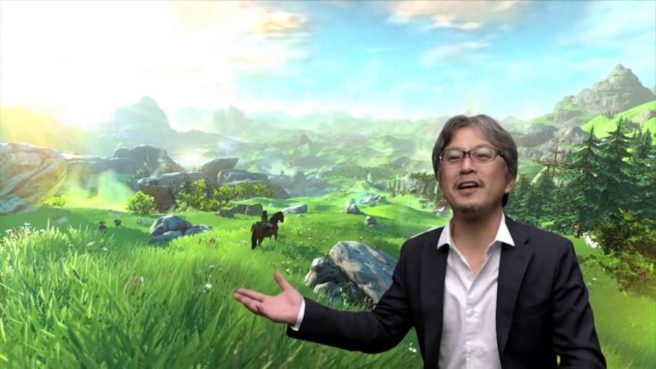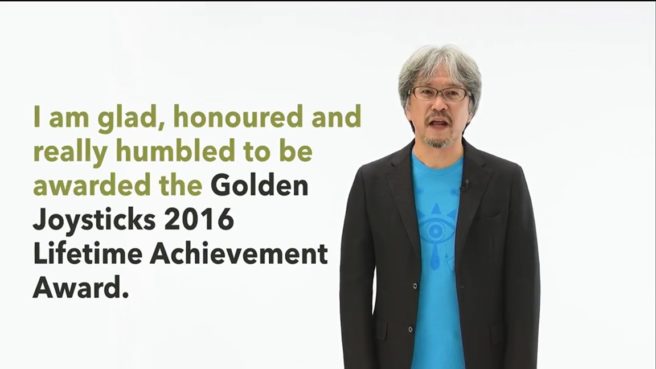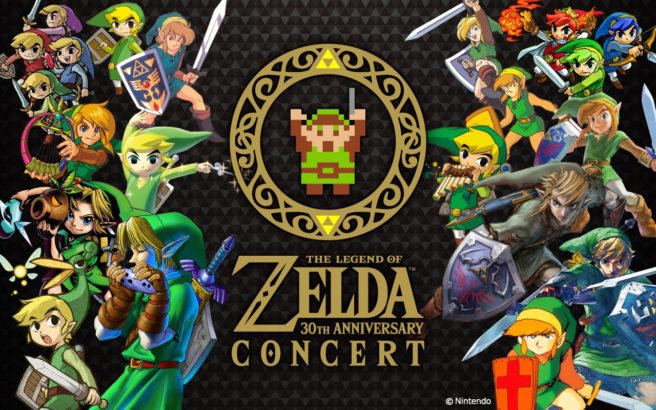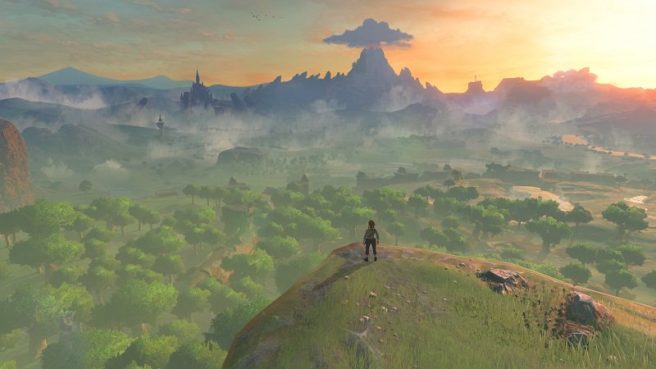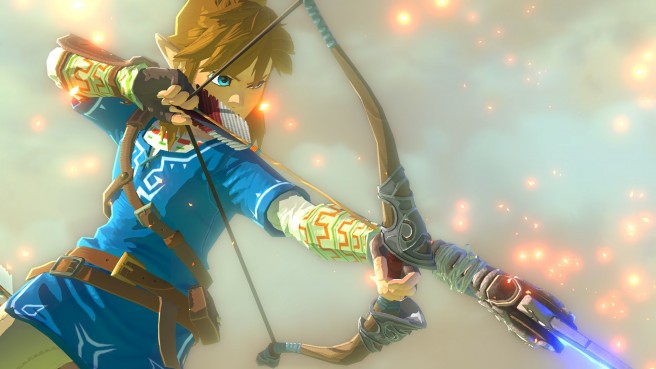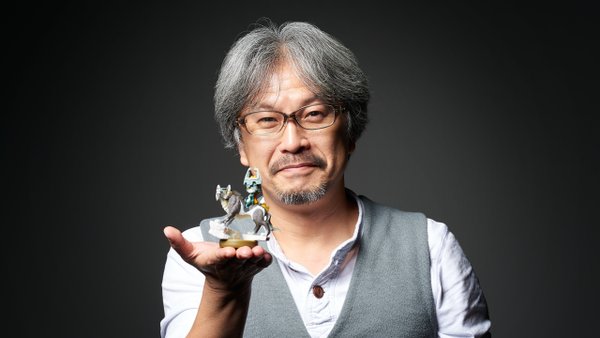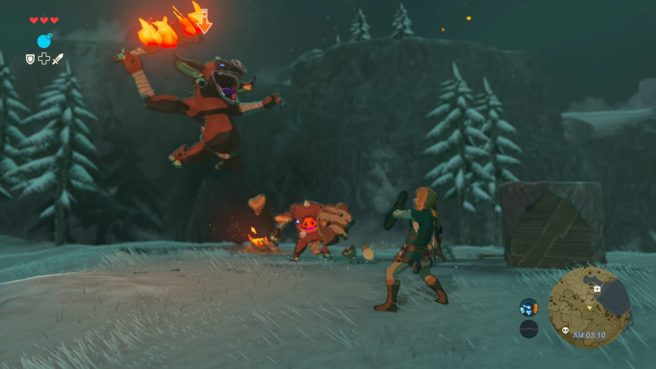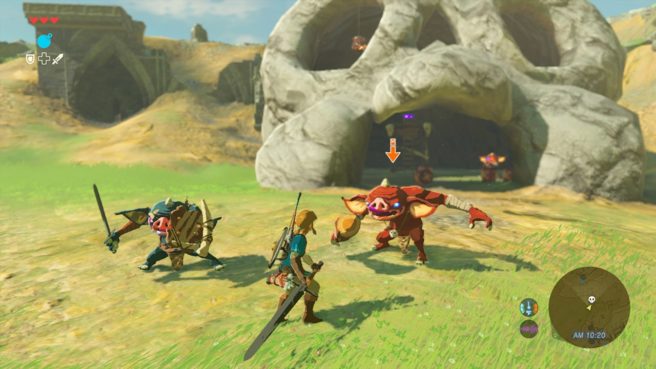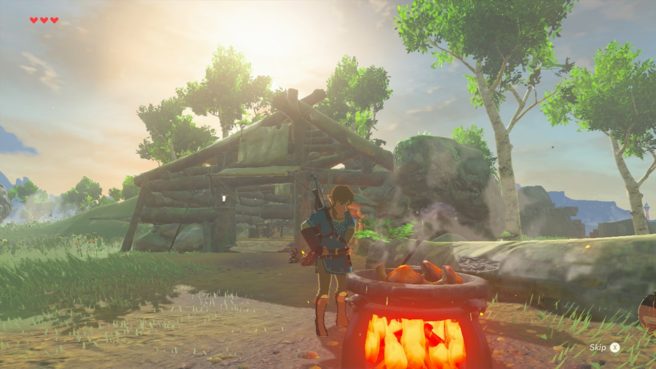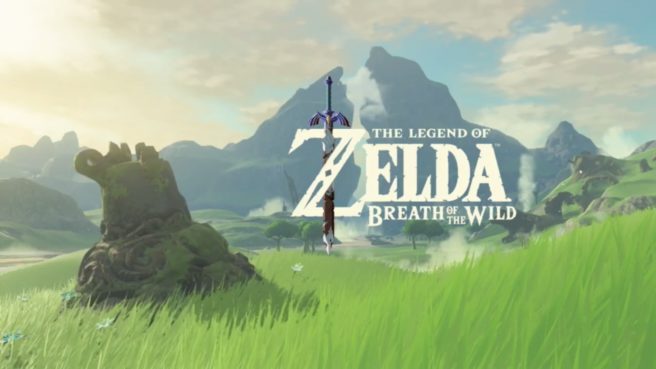Aonuma says Switch could get another Zelda game
Posted on 9 years ago by Brian(@NE_Brian) in News, Switch | 119 Comments
After a long wait, The Legend of Zelda: Breath of the Wild finally launches in March. With the game so close, some fans can’t help but wonder what could come next for the series.
One possibility series producer Eiji Aonuma isn’t ruling out is another title for Switch. “I haven’t been able to fully use all of the new features of the system,” Aonuma told IGN. “There could be the possibility of another Zelda on Nintendo Switch.”
Eiji Aonuma wins Lifetime Achievement Award at 2016 Golden Joysticks
Posted on 9 years ago by Brian(@NE_Brian) in General Nintendo, News | 5 Comments
Last year, late Nintendo president Satoru Iwata was honored with the Lifetime Achievement Award at the Golden Joysticks. Another important staffer at the company was given the same honor today: Zelda producer Eiji Aonuma.
Aonuma wasn’t in attendance, but he did deliver a thoughtful pre-recorded speech. We have it in full below.
Aside from Aonuma’s award, The Legend of Zelda: Twilight Princess was selected as the best Nintendo game of the year while Pokemon GO picked up a win as the best handheld/mobile title as well as Innovation of the Year.
More: Eiji Aonuma, top
Lots of Zelda talk, Breath of the Wild, original planning documents at 30th anniversary concert in Japan
Posted on 9 years ago by Brian(@NE_Brian) in General Nintendo, News, Switch, Wii U | 14 Comments
This past weekend, Nintendo hosted a special 30th anniversary Zelda concert in Kyoto, Japan. It was a big event as key staff involved with the series were present – Shigeru Miyamoto, Eiji Aonuma, Takashi Tezuka, and Koji Kondo. Famitsu shared an in-depth report of what occurred and what was said.
Voice actress Ruriko Aoki hosted the concert. She was actually planning on buying a ticket for the event in Nagoya, and even asked her agency to free up her schedule. However, she was eventually told that she got the job for this concert. Series producer Eiji Aonuma also appeared and introduced Aoki. The two showed up together during a Niconico Majora’s Mask 3D live stream last year, and since she’s a big fan of Zelda, he asked her to be the MC.
Aonuma says it’s been tough implementing Zelda: Breath of the Wild’s day/night cycle
Posted on 9 years ago by Brian(@NE_Brian) in News, Switch, Wii U | 17 Comments
Implementing the day/night cycle in The Legend of Zelda: Breath of the Wild has been “extremely hard,” series producer Eiji Aonuma has said. Part of the challenge has been avoiding a situation where players would encounter “something that was dark and scary.”
Previous Zelda titles have offered day-night cycles of their own. But Breath of the Wild is taking it much further as it directly affects the gameplay. For instance, players will find that enemies sleep at night, and the temperature can drop which has an impact on Link.
Aonuma told EDGE magazine this month about the day/night cycle:
Aonuma: Zelda: Breath of the Wild’s E3 2014 trailer “became the basis for the whole game”
Posted on 9 years ago by Brian(@NE_Brian) in News, Switch, Wii U | 31 Comments
Nintendo gave us a first look at The Legend of Zelda: Breath of the Wild during E3 2014 with a trailer. At that time though, the project hadn’t been completely shaped yet.
Series producer Eiji Aonuma reconfirmed to EDGE this month that the video was running in real time and in-engine. However, the scene shown was made especially for the trailer. When we saw Link shooting arrows at the Guardian on his horse, jumping off, and firing off one last arrow in mid-air at the enemy in slow motion, you couldn’t actually do that.
Aonuma mentioned how he “really wanted to put that in the game” and realized his vision following the trailer. It also made the team expand on Breath of the Wild in terms of story. Interestingly enough, the trailer ended up as “the basis for the whole game.”
Aonuma’s words in full:
Nintendo wants Zelda producer Eiji Aonuma to make a new IP, likes the idea of living as a thief
Posted on 9 years ago by Brian(@NE_Brian) in General Nintendo, News | 38 Comments
Eiji Aonuma has been closely tied to The Legend of Zelda having worked on the series since 1998 with Ocarina of Time. Could he eventually branch out and try something new in the future, though? Possibly.
In an interview with EDGE, Aonuma revealed that Nintendo has actually told him to make a new IP. But at the same time, they want him to continue with Zelda. Aonuma wouldn’t say too much more beyond this. He did mention that he’s interested in the idea “of a game where I can live as a thief,” but didn’t elaborate further.
Aonuma’s full comments:
“Actually, Nintendo has been telling me to create a new IP. But then, they’re also telling me to make more Zelda games. I can’t really share much; I’m not sure I’m allowed to say anything. But I really like the idea of a game where I can live as a thief. That’s all I’ll say.”
More: EDGE, Eiji Aonuma, interview, The Legend of Zelda, top
Aonuma offers up a different reason for Zelda: Breath of the Wild’s delay, more
Posted on 9 years ago by Brian(@NE_Brian) in News, Switch, Wii U | 49 Comments
The Legend of Zelda: Breath of the Wild wasn’t originally supposed to come out next year. Nintendo had a target year of 2015 set in mind, but that was pushed back last March. It was delayed once more following an announcement this past April, when Nintendo also confirmed an NX version.
Shigeru Miyamoto and Zelda producer Eiji Aonuma both spoke about the reason to delay Breath of the Wild at E3 last month. The main thing we heard about was difficulty in implementing the physics engine. That’s still true, but while talking with EDGE, Aonuma also discussed how development itself ran into some issues.
He explained:
Aonuma on Zelda: BotW – art style, expanding from Skyward Sword, music, logo, more
Posted on 9 years ago by Brian(@NE_Brian) in News, Switch, Wii U | 11 Comments
Game Informer now has its full interview up with Eiji Aonuma about The Legend of Zelda: Skyward Sword. The project’s producer tackled topics like the art style, trying to expand on Skyward Sword, whether the team was inspired by particular open world games, music, logo, dungeons, and more.
Head past the break for Aonuma’s comments. For the full interview, head on over here.
Aonuma, Miyamoto, Trinen on Zelda: BotW – towns, clothing, missions, story
Posted on 9 years ago by Brian(@NE_Brian) in News, Switch, Wii U | 24 Comments
IGN is back with another feature on The Legend of Zelda: Breath of the Wild. The site has more commentary from producer Eiji Aonuma, Shigeru Miyamoto, and Bill Trinen on the game. Topics include towns, Link’s clothing (including the blue tunic), missions, and story.
Head past the break for the rundown of Aonuma, Miyamoto, and Trinen’s comments on these aspects. The rest can be found here.
Breath of the Wild is purely single-player, but Aonuma wants to make another multiplayer Zelda
Posted on 9 years ago by Brian(@NE_Brian) in News, Switch, Wii U | 50 Comments
Zelda producer Eiji Aonuma has confirmed that Breath of the Wild will focus purely on a single-player experience. However, that isn’t to say he isn’t interested in multiplayer – far from it actually.
Aonuma told IGN when it comes to multiplayer and Zelda:
“I would like to take what I learned from Breath of the Wild and see if we can somehow fuse those learning points into another multiplayer Zelda. For example, with Triforce Heroes, which followed a similar format of Four Swords, there was a multiplayer involved in that game. That’s definitely a possibility and we will continue to [experiment] throughout the Zelda franchise.”
When Zelda: Breath of the Wild was first teased in a January 2013 Nintendo Direct, Aonuma spoke about going against the conventions of Zelda. One of these points involved challenging the notion of playing by yourself. While it doesn’t seem like Breath of the Wild will be tackling this in the end, perhaps it’s something we can look forward to in the future.
